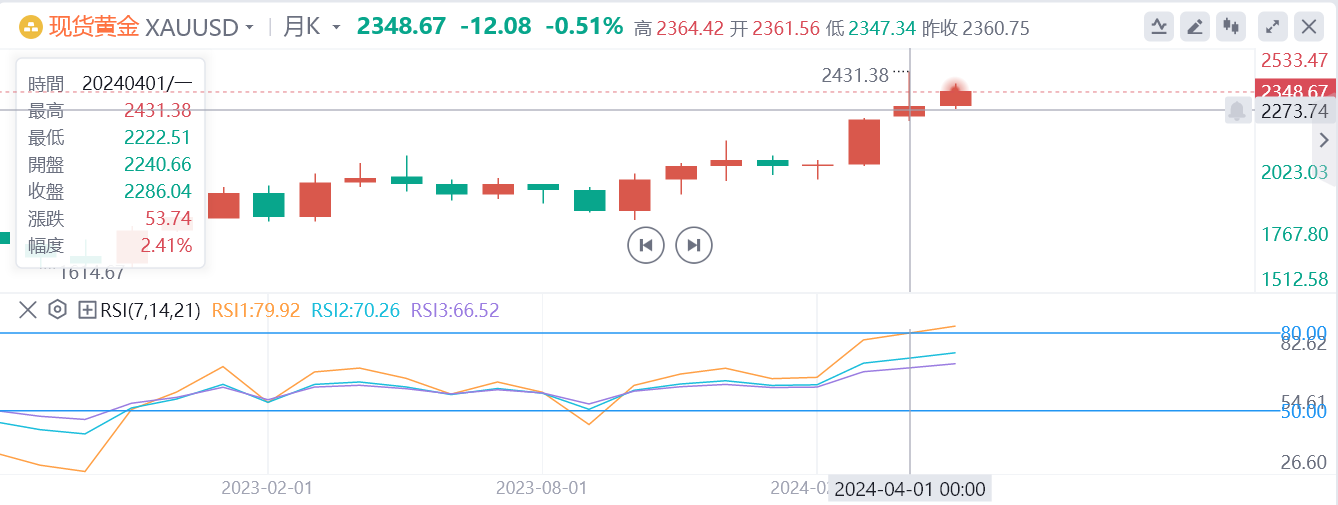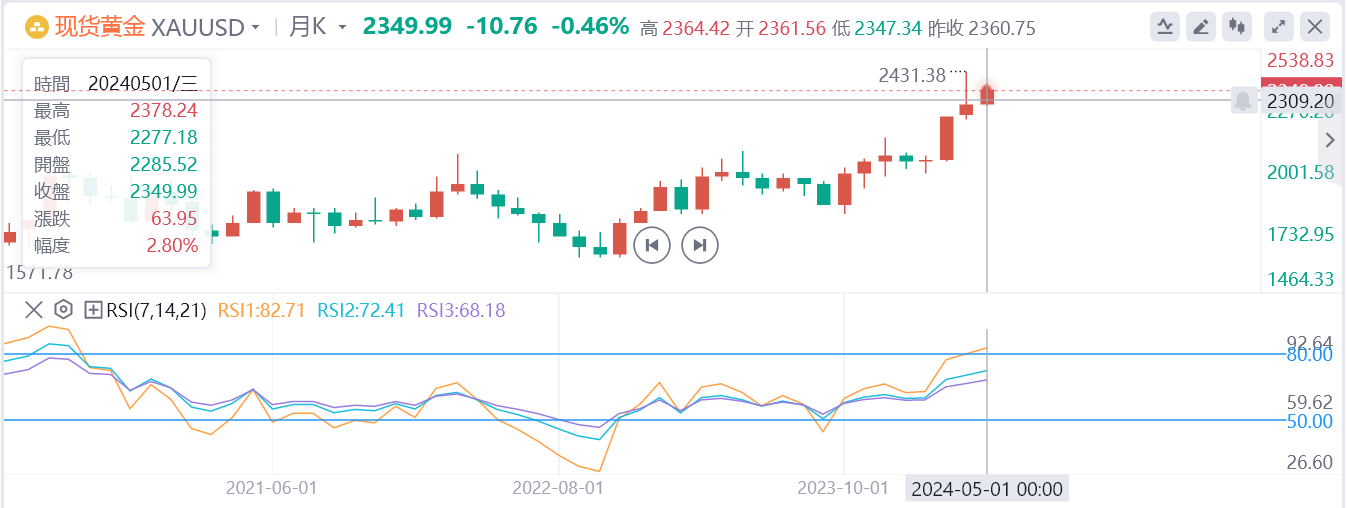Best Performance in Nearly 5 Weeks: Gold Spot Prices at a Crossroads
Despite a strong demand for purchases, the risk factor for the rise in gold lies in the uncertainty of the Federal Reserve's monetary policy.
After a year of robust growth in 2023, gold prices have reached a crossroads in 2024.
After hitting a historical high in April, international gold prices have entered a fluctuating downward trend since May.
In April, due to the easing situation in the Middle East and the Federal Reserve's indecisive approach to interest rate cuts, the gold rally lost steam. Especially since the middle and late April, with exchanges warning of volatility risks and the rising cost of buying long positions as gold prices hit new highs, the market's overbought sentiment has been somewhat released, and some speculative funds that followed the trend exited, leading to a slight pullback in gold prices.

Throughout April, the price of gold spot fluctuated, first rising and then falling. It once surged past the $2430 per ounce mark on April 12th, then fell sharply on April 22nd and 30th, losing nearly 5 percentage points in two days, with the lowest point recorded at $2,222.51 per ounce. By the end of April, the spot gold price still rose by 2.41%.
Entering May, as U.S. employment data and initial claims data continue to surprise with cold figures, market confidence in the Federal Reserve's interest rate cuts has begun to strengthen, leading to a surge in gold buying again. As of the time of writing, gold prices have rebounded from last week's lows, with the highest price touching $2,378.27 per ounce on Friday, the highest since April 22nd; last week's gain was nearly $60, marking the best single-week performance in five weeks.

Last Friday, the University of Michigan's preliminary consumer sentiment survey showed that U.S. consumer optimism has fallen to a five-month low, and high interest rates are stifling consumer purchasing behavior. In such a situation, the U.S. financial market expects the Federal Reserve to start an easing cycle in September. Saxo Bank said that with inflation under control, the expected number of U.S. interest rate cuts has increased from one to two.
In addition, the resurgence of geopolitical conflict has also ignited confidence among gold bulls. Last Sunday, after a night of fierce air and ground bombardment, Israel moved tanks into the eastern part of Jabalia in the Gaza Strip. Palestinian health officials said the bombardment caused 19 deaths and dozens of injuries.
Dr. Muhammad Umair, a financial market strategist and founder of Gold Predictors, stated that gold prices will continue to rise in 2024. With the continuous purchase by the People's Bank of China, the rise of the Federal Reserve's dovish stance, and the unchanged tensions in the Middle East, gold prices are expected to push towards a new high of $3,000.
Umair pointed out that gold prices have performed strongly in 2024, influenced by various economic and geopolitical factors. Even in the face of a strong U.S. dollar and a hawkish stance by the Federal Reserve, this resilience of gold prices highlights the underlying strength of the gold market. A strong dollar and hawkish actions by the Federal Reserve usually put downward pressure on gold, as rising interest rates increase the opportunity cost of holding non-yielding assets like gold. However, the continued strong performance indicates that there are other important supporting factors at play.
Alex Kuptsikevich, a senior market analyst at FxPro, also believes that from a technical perspective, gold and silver are regaining momentum after successfully holding key retracement levels. He said, "The latest upward momentum has made people realize again that the decline in the second half of April was a corrective pullback." However, Kuptsikevich added that despite the strong rise in gold and silver, there is still a lot of work to be done to attract new capital and push prices above the recent historical high of $2,431.
With a renewed focus on economic fundamentals, some analysts have pointed out that this week will be a critical moment for gold and silver to recover and reach record highs. International precious metal prices are gradually arriving at their respective "crossroads."
Despite the presence of buyers, the risk point for the rise in gold prices lies in the uncertainty of the Federal Reserve's monetary policy. China Gold International said that the postponement of the Federal Reserve's interest rate cut expectations may mean that the speculative trading phase of the gold market has not yet ended, and the premium of gold prices over their fair value may continue to exist before the Federal Reserve's interest rate cut is finalized. In the baseline scenario where there is no global turmoil or economic recession, the finalization of the Federal Reserve's interest rate cut may become the "trigger" for the bursting of the gold bubble.
The main economic event this week will be the April Consumer Price Index (CPI), as the Federal Reserve has indicated that its efforts to combat inflation are insufficient due to prices still being far above the 2% target. In addition to U.S. CPI data, some analysts have said that U.S. retail sales data (commonly referred to as "terror data") will also attract some market attention. Traditionally, consumers who are less optimistic about the health of the economy will reduce spending, which will put pressure on economic activity.
Barbara Lambrecht, a precious metals analyst at Commerzbank, believes that "if (consumer) prices rise strongly again, the recent hopes for a slight interest rate cut may be dashed once more. At that time, gold prices should fall again."
·Original
Disclaimer: The views in this article are from the original Creator and do not represent the views or position of Hawk Insight. The content of the article is for reference, communication and learning only, and does not constitute investment advice. If it involves copyright issues, please contact us for deletion.